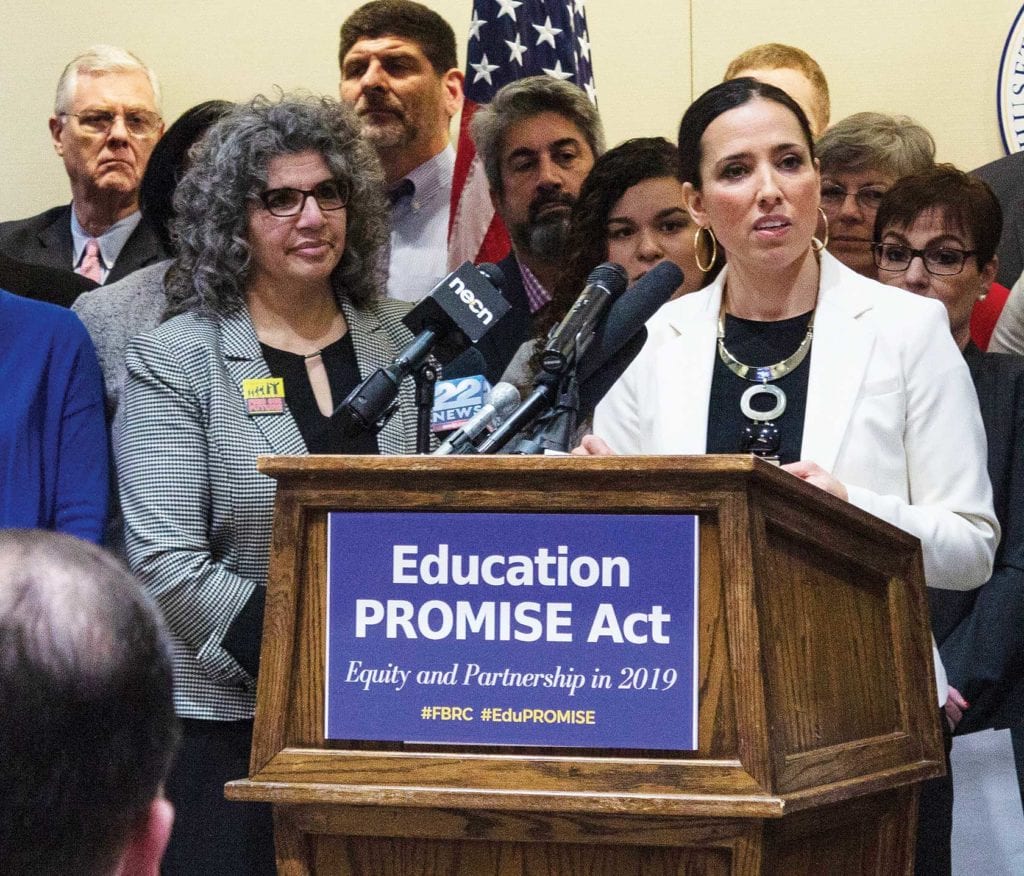A legislative push for school funding
Unions, municipal officials back PROMISE Act

State Sen. Sonia Chang-Diaz announced an education finance reform bill Wednesday that would create a guaranteed minimum level of funding for all districts in the state, as well as implement recommendations from the state’s Foundation Budget Review Commission (FBRC).
The bill, titled the Education PROMISE Act and co-filed with representatives Aaron Vega of Holyoke and Mary Keefe of Worcester, would make changes to the education foundation budget, a minimum set by the 1993 Education Reform Act for how much each school needs to adequately serve its students.
“A quarter-century ago, our state made a promise that every child, no matter her ZIP code, her language, her disability, her income, would be provided what she needed to succeed in school,” Chang-Diaz said at a Wednesday morning press conference. “This is a promise we have not kept.”
In November 2015, the FBRC, a 21-member bipartisan task force, released its final report containing recommendations for changes to the state’s education budget. The recommendations include increasing funding for health insurance, special education, English language learners and districts with a high concentration of low-income students.
The Education PROMISE Act would implement these recommendations in annual phases.
Mary Bourque, superintendent of Chelsea Public Schools and one of the members of the FBRC, noted the drastic changes in student demographics since 1993, and expressed disappointment that the recommendations she had helped write had not yet been implemented.
“We were hopeful that the leaders in our state recognized the need to address the consistent erosion of funds that were intended to flow to the classroom and to the next generation of leaders,” Bourque said. “Our hope has waned since 2015 with each passing year.”
The bill is supported by a wide coalition of Massachusetts legislators, activists and community leaders, many of whom voiced their concerns at the press conference.
“Pervasive and persistent racial and ethnic achievement gaps are constant reminders of the impact economic inequality has on our education system,” said Tanisha Sullivan, president of Boston NAACP. “We have the best educational system in this country, but we need it to be better, and better starts with appropriate, equitable funding.”
Educators and students also attended, giving their own personal stories to the bill.
“Working as an educator and experiencing firsthand the differences between well-funded school districts and grossly underfunded ones lays bare the reality of the inequality,” said Zena Link, an educator and advocate from Worcester. “Having worked in an underfunded district, I have observed the direct correlation between underfunding, mental health challenges, narrowing curriculum. It goes hand in hand with excessive testing and the criminalization of students.”
The Massachusetts Teachers Association has also voiced its support for the bill, echoing Link’s comments.
“We have many excellent public schools in Massachusetts, but we also have huge disparities in opportunities and resources,” MTA president Merrie Najimy said in a statement. “It is grossly unfair that students in some districts are taught in classes with 30 students while students in others attend classes with an average size of 15 students.”
Boston Mayor Marty Walsh has included the Education PROMISE Act as part of his 2019 legislative agenda, saying that it will benefit students in Boston Public Schools. Walsh said that the city invests over $1.3 billion a year into its schools, but that state funding has not kept up with growing budgets.
“The current education funding results in less net state funding every year for our students,” he said. “If the status quo persists, in the city of Boston, we will get zero state education aid to support our students [in two years]. We will be paying the state.”
Walsh also noted that urban school districts such as Boston, Worcester, Lawrence and Medford contain the majority of economically disadvantaged, special education and English language learner students in the state.
“When education reform happened in 1993, it was groundbreaking. But that was the 20th century, and a 20th-century formula doesn’t work for a 21st-century education anymore,” Walsh said.






